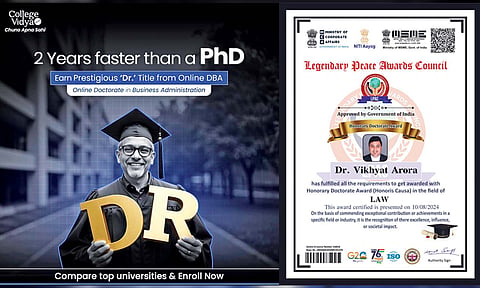

CHENNAI: A burgeoning scam has recently come to light in India, where deceptive entities are selling honorary doctorate degrees to unsuspecting individuals in exchange for hefty sums of money.
These organisations, disguised as prestigious institutions, are exploiting the aspirations of people seeking to bolster their academic credentials with fraudulent degrees.
Investigations have uncovered that several such entities, including the Legendary Peace Awards Council, Well Educational and Peace Council, and the American Merit Council, among others, have been actively promoting their so-called honorary doctorate programmes on social media platforms such as Instagram, Facebook, and X.
These entities claim that their honorary degrees are officially sanctioned by the Government of India and the University Grants Commission (UGC), when, in fact, they are entirely illegitimate. They offer honorary doctorate degrees for a fee ranging from Rs 15,000 to Rs 45,000.
The process is alarmingly lax – all that is required from the prospective recipient is a passport-sized photo, a government-issued identification (such as an Aadhaar card), a CV or a set of achievement pictures, and a brief profile.
When DT Next contacted a representative from the Legendary Peace Awards Council, Preeti, the public relations officer (PRO), detailed the scheme: "If you want to receive the degree in person, where the event will be graced by Union ministers and other government officials, the cost is Rs 25,000. Alternatively, if you prefer to have the degree sent by courier, the charge is Rs 15,000. Along with the degree, recipients are promised a lifetime free membership certificate, an ID card, a gold-plated memento, a trophy, a medal, a vehicle sticker, sashes, live media coverage, a photo shoot, and a group photo. There's even the opportunity to deliver a speech in front of the chief guests."
Similarly, Sathya, the coordinator for the Well Educational and Peace Council, elaborated this correspondent on the fee structure: "For those who want the degree in-person, the cost is Rs 30,000, whereas receiving it by courier would set you back by Rs 25,000."
"If you opt for attestation from the Ministry of External Affairs, the price rises to Rs 45,000. We also offer free lifelong legal services if you face any issues in the future," she stated.
Experts from the academic community have swiftly condemned these practices, labelling them as nothing short of exploitation.
A Shankar Prakash, a social and behavioural science researcher, voiced his deep concerns, stating, "These fraudulent degrees not only undermine the value of legitimate doctoral achievements but also erode global trust in the Indian education system."
He has already written to the chairman of the UGC, urging swift action against these deceitful entities.
E Balagurusamy, the former vice-chancellor of Anna University, also raised alarms about this growing trend.
"Honorary doctorates are now being awarded by fake universities and registered societies not just in India but globally as well. This is a dangerous practice that devalues the credibility of genuine academic credentials," he told this newspaper.
He highlighted that some senior government officials, judges, and ministers were complicit in attending and even participating in these illegal events, further exacerbating the problem.
Balagurusamy has written to the UGC, calling for a crackdown on these fake universities and societies, urging immediate action through law enforcement.
Fake doctorates tarnish India’s global image: Academics
Career guidance specialist and consultant D Nedunchezhian weighed in on the broader implications of such scams.
"The proliferation of fake honorary doctorates, fake universities, and counterfeit PhD degrees is tarnishing the reputation of India's higher education sector. The dominance of such fraudulent institutions has been particularly prevalent since 2010, with northern states bearing the brunt. This trend is mocking the integrity and value of Indian students in the global arena," he lamented.
Nedunchezhian further emphasised that Union Education Minister Dharmendra Pradhan must urgently address this growing menace.
"The UGC, which has been releasing an annual list of fake universities since 1994, has been working to protect students from falling prey to such fraudulent institutions. However, the rising tide of these scams calls for more stringent efforts from the regulatory bodies to safeguard the integrity of India's education system," the vice-chancellor of a state-run university told this correspondent, expressing the need for a more proactive approach from both the UGC and the central government to combat these growing threats to academic legitimacy.
UGC chairman Mamidala Jagadesh Kumar did not respond to our queries.
According to advocates K Dhivayashree and BU Akshay Raam, the conferral of honorary doctorates and the offense of forgery in India are governed by specific laws.
Advocate Dhivayashree, practicing at the Madras High Court, emphasised that forgery-related offenses are punishable under Sections 318 and 336 of BNS, with a maximum prison term of seven years and a fine.
She highlighted that the usage of forged certificates constitutes cheating, predominantly prevalent in the medical and legal professions.
The repercussions of such actions can lead to unethical practices, ultimately eroding the trust reposed in the judicial system.
Echoing similar sentiments, advocate Raam, also practicing at the Madras High Court, stated that in India, only universities recognised by the UGC possess the legal authority to confer honorary doctorates.
"Furthermore, such conferrals must adhere to established procedures and ethical standards. The sale of honorary doctorates is a punishable offense under Sections 318, 336, and 338 of BNS, as well as other applicable provisions of the UGC Act and Regulations," he said, pointing out that private universities in Tamil Nadu are empowered to grant honorary doctorates under Section 13 (e) of the Tamil Nadu Private Universities Act.
"However, such grants must be made to honour achievements rather than for commercial purposes. Institutions lacking recognition have no legal right to issue doctorates, rendering their honorary titles both misleading and invalid," he noted.